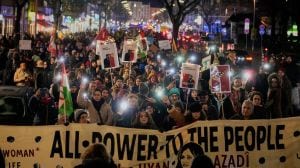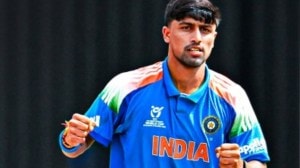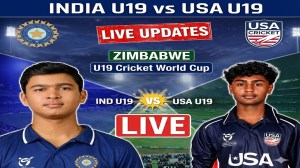No just solution
Any increase in activity over finding a settlement to the Ayodhya imbroglio, produces more anxiety than clarity. The circumstances that have...

Any increase in activity over finding a settlement to the Ayodhya imbroglio, produces more anxiety than clarity. The circumstances that have produced this crisis are such that even the most palatable settlement will be only a second best solution. The crisis continues to signify a breakdown of our legal and constitutional arrangements. The demolition of the Babri Masjid was an act of constitutional usurpation for which there have been no real apologies. Now a raucous and dishonorable trading of charges over who was responsible comes as a reminder that if Ayodhya is about religion, it is about religion in its most sordid sense. The Indian legal system has, for four decades, been unable to decisively lay the dispute to rest.
A BJP-led political movement took the Ayodhya movement to new emotive heights and often left its mark of violence on innocent citizens. The Congress first opened up the issue to compensate for its own myopic interpretations of secularism and is still not sure where it stands. There is an assortment of groups, from the VHP to the Babri Masjid Action Committee, whose claims to represent their respective communities are, at best, dubious. Now there is the venerable Shankaracharya, whose authority would come to little if the government refused to do business with him. Finally, there is the democratic voter. While a significant minority is passionate about building a mandir, and a very tiny minority passionate about stopping it, most are too fed up to care. With these protagonists can there be any real solution?
So what is the politics behind this latest manoeuvre? Firstly, don8217;t be fooled by the public row between the VHP and BJP. In the past, such rows have not led to a significant parting of ways. Indeed the chintan baithak seems to have reaffirmed the VHP8217;s agenda on conversion and ban on cow slaughter. The sangh parivar is a relatively well orchestrated outfit and even such disagreements have their political uses. The BJP is the party of Narendra Modi and Vinay Katiyar as much as it is the party of Vajpayee and Advani. In all likelihood, the VHP8217;s outburst is part of a pressure tactic to get Muslim groups to succumb. It8217;s a way of saying 8216;8216;if you don8217;t settle, see what might be waiting in the wings.8217;8217; This is a time-honored tactic of the BJP: Use its own extreme wings to make it look ever so reasonable.
Whether or not it is intended as such, the Shankaracharya8217;s proposal is a political bonanza for the BJP. Suppose the Babri Masjid Action Committee and the Muslim Personal Law Board do not accept the proposals. Will not the BJP and VHP get a handle against Muslims? 8216;8216;Look at them8217;8217;, will be the refrain. 8216;8216;We were so generous, a hundred mosques and all that, still Muslim groups remain intransigent.8217;8217; Given the right circumstances, this kind of appeal is not entirely inconsequential. If the stalemate continues and the BJP find itself out of power, it still has the wherewithal to undertake mobilisation around this issue. It will say, 8216;8216;We tried everything and nothing worked.8217;8217;
A rejection of this proposal could also pave the way for a legislative solution. Given the Congress8217;s tepid stance, and Sonia Gandhi8217;s tacit acceptance of the seer8217;s authority, one cannot be too confident that they will have the courage to openly oppose any legislative proposals. The NDA allies would prefer the status quo, but Samata is already taking an undue interest in the proposal. As the behavior of the NDA after Gujarat showed, there are no lakshman rekhas in Indian politics. Every one will take cover behind the fact that this seemingly generous proposal was turned down.
If the proposal is accepted in some form, the BJP will claim victory. The VHP8217;s canard about not giving up Mathura and Kashi is a non-sequitor. First, the status of those places is already protected by legislation. Second, it is unlikely that without BJP support the VHP will be able to mount any significant mass campaign on those two sites. Third, it is probably again a bargaining counter, to maximise their leverage on issues such as conversion that will remain with us long after Ayodhya is settled. Either way, the timing of the Shankaracharya8217;s move is also not without significance. Close enough to an election to allow the BJP to keep all its options open.
This is the sordid political game within which this dispute is now placed. A settlement by whoever claims to be the Muslim leadership will be a victory for strong-arm majoritarian tactics, a betrayal of constitutionalism and legality. A refusal to settle will put minorities at political risk, and irrespective of the outcome of the next elections, it will give a long term boost to Hindutva. This is, sadly, the country in which we live. It has to be said that most of the leadership of the Babri Masjid Action Committee or the Muslim Personal Law Board seems to care neither for the long term prospects of secular principles, or the well being of their own constituents. None of their leaders, Syed Shahabuddin included, are known for any initiatives that would strengthen a genuine constitutional secularism. They have been more interested in preserving a role for themselves.
Given the realities of Indian politics, a dogmatic insistence on a legal solution is simply moral laziness, the privileged preserve of those who do not have to face violent rampages. As much as some of us loath the idea that on the Ayodhya issue, even an inch should be conceded to the BJP, we should recognise the fact that our institutions and our high-minded legalism does not protect those Muslims on behalf of whose interests we pretend to speak. The law often does not protect Muslims, the law is not a political answer to Hindutva, and the law is not a substitute for an enduring political settlement. If, as many Muslims have argued, it is time for a settlement, the Muslim Personal Law Board and the Babri Masjid Action Committee should not stand in the way.
That any temple built at Ayodhya will have been built on the blood of so many innocent lives, and by imperiling so many moral and constitutional principles, ought to be a matter of shame for most Hindus who care about Ram. This is an issue on which there is unlikely to be any settlement that appears just. But there is no option other than to try and pour cold water over the whole matter, and a settlement at least gives us an opportunity. As a society we long gave up on justice. At the present conjuncture, we can only hope that we will at least opt for prudence.
- 01
- 02
- 03
- 04
- 05































